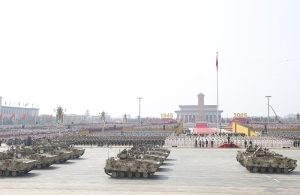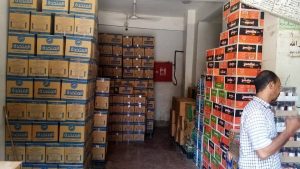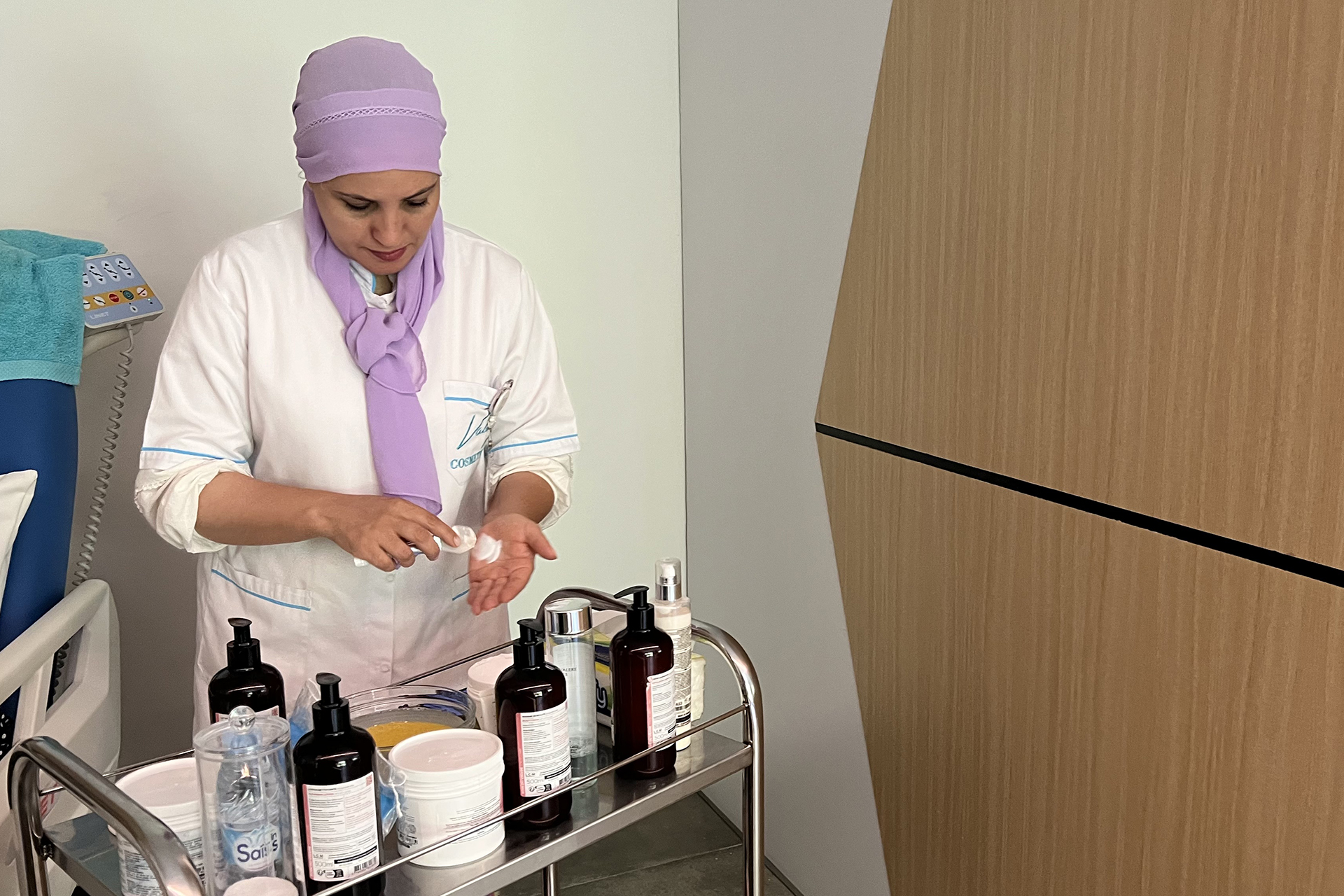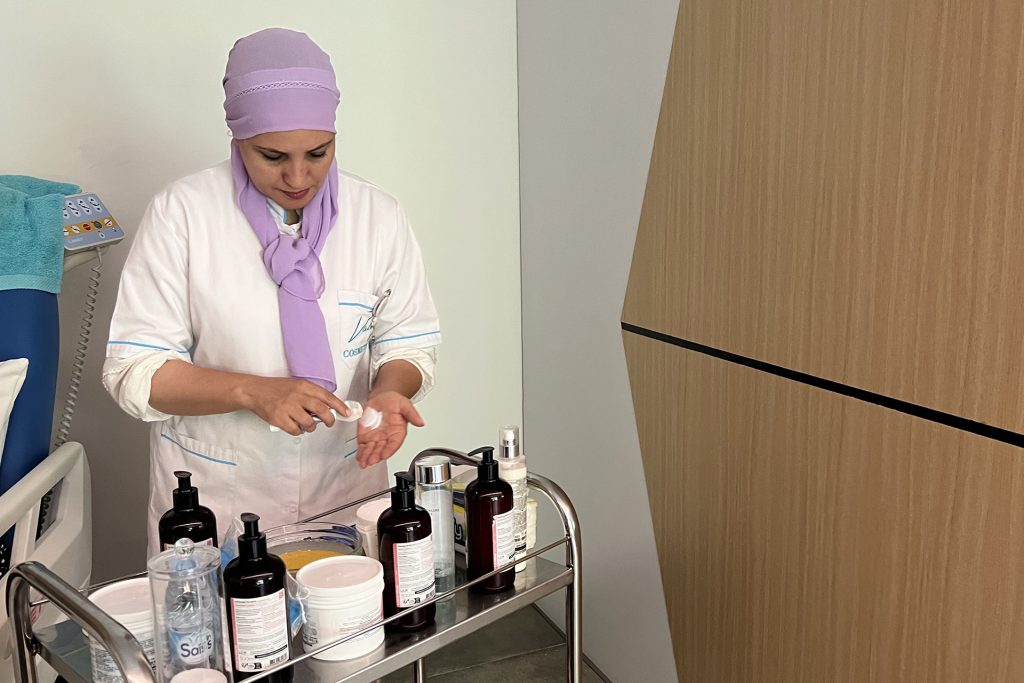Rabat – Every Friday, Moroccan Najat Benamara visits the cancer treatment hall at the 16 November Clinic in Rabat, wearing a white coat and pushing a cart full of beauty products and creams. She stands beside a cancer patient undergoing chemotherapy, offering a facial care session and hand massage, but more deeply, she gives something far more precious: hope.
She moves from bed to bed, providing free beauty sessions and sincere conversations while the medicine flows into their bodies drop by drop.
Since 2021, Najat has chosen to return to the place where she fought her battle with cancer, not as a patient this time, but as a companion to women facing the same fear. She shares her experience and opens honest dialogues about fears and anxieties while chemotherapy continues.
Najat’s story began in 2013 when she was five months pregnant and preparing for childbirth, only to be shocked by a diagnosis of cervical cancer after unexpected bleeding.
Faced with the harsh decision to remove her uterus along with the fetus, she recalls wishing to postpone surgery until after birth, but doctors warned the disease was spreading rapidly.
Her life turned upside down as she underwent surgery followed by exhausting chemotherapy and radiation treatments, describing the experience as physically, psychologically, and financially draining.
The disease revealed the true nature of those around her; some close ones withdrew while strangers offered support. She summarizes this lesson: “This illness strips away illusions, reveals who truly loves you and who was just a shadow in your life.”
The hardest part was not the physical pain but the psychological struggle, moments of weakness and despair, questioning if she would ever return to her former self. Yet, she discovered her inner strength, calling cancer a harsh teacher awakening her to reality.
Now, years after completing treatment, Najat has not forgotten the lessons cancer taught her. She chose to support others, sharing the message that although cancer seems deadly, it can be tamed with patience, faith, and human support.
Her eyes shining, she says, “Cancer stole much from me but gave me a new outlook on life. I no longer pretend or waste time with those who don’t deserve it. I learned to live honestly and with those who give me true love.”
Dr. Latifa Misbah, a radiation oncology specialist on Najat’s medical team, explains that treating cancer patients goes beyond medical diagnosis to understanding their psychological state.
Patients typically go through denial, anger, and rejection phases, questioning “Why me?” Some refuse treatment or fear it excessively, while a few accept the disease from the start.
The medical team’s role is to help patients reach acceptance, as treatment cannot be effective if the patient remains depressed.
This psychological aspect is challenging, especially since patients are anxious to start treatment quickly, but thorough tests are needed to determine cancer type, stage, and appropriate plan.
Dr. Misbah advises many patients to see a psychologist, but cultural barriers often prevent patients from acknowledging mental health issues despite symptoms like insomnia, loss of appetite, and isolation.
To overcome these barriers, the clinic organizes workshops and activities such as painting, choir, yoga, walking, jewelry making, and knitting, alongside peer support programs where survivors help current patients.
During her illness, Najat benefited from painting workshops, building positive relationships and escaping illness through colors and brushes.
She laughs recalling how her early paintings used dark colors reflecting her mood, later shifting to brighter hues.
Paintings from these workshops are exhibited in the clinic, with proceeds funding activities. Choir sessions boosted Najat’s confidence, helping her overcome shyness by blending her voice with the group.
Dr. Latifa and colleagues founded the Moroccan Association for Supportive Cancer Care to ensure patients’ rights to supportive treatments including psychological support, proper nutrition, and pain relief medication. She states, “We believe illness is the patient’s fate, but they should not suffer; they deserve quality of life through appropriate care.”
Morocco records about 50,000 new cancer cases annually. Breast cancer is the most common among women at 36%, followed by cervical cancer at 11%. Among men, lung cancer is most prevalent at 22%, then prostate cancer at 12.6%.














Recommended for you
Exhibition City Completes About 80% of Preparations for the Damascus International Fair Launch
Talib Al-Rifai Chronicles Kuwaiti Art Heritage in "Doukhi.. Tasaseem Al-Saba"
Unified Admission Applications Start Tuesday with 640 Students to be Accepted in Medicine
Egypt Post: We Have Over 10 Million Customers in Savings Accounts and Offer Daily, Monthly, and Annual Returns
His Highness Sheikh Isa bin Salman bin Hamad Al Khalifa Receives the United States Ambassador to the Kingdom of Bahrain
Al-Jaghbeer: The Industrial Sector Leads Economic Growth